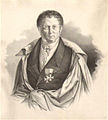Philanthropist Vechelde
| Philanthropist | |
|---|---|

|
|
| The philanthropist in the Vechelde Castle, copper engraving by Anton August Beck , around 1760 |
|
| founding | 1804 |
| closure | 1819 |
| place | Vechelde |
| country | Lower Saxony |
| Country | Germany |
| Coordinates | 52 ° 15 '40 " N , 10 ° 22' 44" E |
| management | Johann Peter Hundiker |
The Philanthropin in Vechelde near Braunschweig was a private school institute that existed from 1804 to 1819 and taught according to the principles of philanthropism . The history of this “educational institution for higher classes ” is closely linked to the educational work of Johann Peter Hundiker .
history
Inspired by the work of the pedagogue Johann Bernhard Basedow at his school in Dessau , the Philanthropinum Dessau , Hundiker founded the Vechelder facility based on the Dessau model. He found support from Duke Karl Wilhelm Ferdinand of Braunschweig, who gave him the Vechelde Castle near Braunschweig . The school was founded on October 29, 1804, the inauguration ceremony on June 10, 1805.
Although conceived as an educational institution for “higher classes” and always described as such by Hundiker, the teaching content was not only aimed at pupils from noble families, but also at those of the bourgeoisie and pupils of foreign origin. The institute was also visited by students from Russia, England, Sweden and other countries. The curriculum included content such as modern languages, science , gymnastics and dance, as well as business arithmetic and commercial geography .
The educational concept was intended to educate young people in everything necessary for life to become capable, cheerful people. This exclusively through friendly, loving instruction . However, contrary to Basedow, Hundiker represented the opinion of Joachim Heinrich Campes that the entire teaching should serve to change social conditions. Basedow saw the philanthropic ideal of education in preparation for the existing conditions.
After the Duke's death on November 10, 1806, the period of the Kingdom of Westphalia created by the French Emperor Napoleon Bonaparte followed . When the Westphalian government intended to sell Vechelde Castle and Hundiker saw the existence of his school in danger as a result, he bought the building with his own funds.
Due to the Napoleonic wars , the number of pupils decreased considerably, especially the pupils from countries outside the Braunschweig territory stayed away. In 1809 the institute had around 30 to 40 students. When, after the Napoleonic period, under the government of Duke Charles II of Brunswick, the sale was contested and the return of the castle was demanded, Hundiker accepted a court settlement . He handed over Vechelde Castle to the Duchy of Braunschweig in return for an annual pension.
After fifteen years of existence, he dissolved his educational institution in Vechelde in October 1819. Hundiker moved to Lößnitz near Dresden, where he taught at Carl Lang's boys' education institution at Wackerbarth Castle until 1823 and later devoted himself to other literary work.
The castle was demolished in 1880 and replaced with a neoclassical building. Until January 1, 1972, it served as the seat of the Vechelde District Court. Today it is used as a community center. The park was preserved.
Known teachers
- Johann Ahrend Christian Faber (1766–1834), German pedagogue, theologian and philologist
- Wilhelm August Förstemann (1791–1836), German educator and mathematician
- Karl Ludwig Wilhelm Francke (1796–1870), German educator and philologist
- Johann Peter Hundiker (1751–1836), German educator and ducal Brunswick school councilor
- Gerhard Julius Hundiker (1784–1854), German educator and novelist
- Wilhelm Theodor Hundiker (1786–1828), German educator and philologist
- Hans Rudolf Schröter (1798–1842), German pedagogue, mathematician and historian
- Johann Heinrich Westphal (1794–1831), German educator, astronomer and writer
Known students
- August von Geyso (1802–1861), Minister of State in the Duchy of Braunschweig
- Ferdinand Mackeldey (1784–1834), German lawyer and professor at the Universities of Helmstedt, Marburg and Bonn
- Eduard Schmidt von der Launitz (1797–1869), German sculptor and art historian
literature
- General Literature Newspaper . Volume 1, Num. 46. Halle, Leipzig 1807, pp. 366-368.
- Ferdinand G. Becker: The educational institution in Vechelde or news of the establishment, the progress and the current constitution of this institution . Becker, Gotha 1806.
- Bernd Feige: Philanthropic reform practice in Lower Saxony: Johann Peter Hundiker's educational work around 1800 . Böhlau, Cologne Weimar Vienna 1997, ISBN 3-412-07596-5 .
- Matthaeus Cornelius Münch : Universal encyclopedia of education and teaching . Volume 3. Augsburg 1860.
Individual evidence
- ↑ Allgemeine Literatur-Zeitung . Volume 1, Num. 46. Halle, Leipzig 1807, p. 368.
- ↑ Royal Society of Sciences (ed.): Göttingische learned advertisements . Volume 3. Göttingen 1806.
- ↑ August Lambrecht: The Duchy of Braunschweig. Stichtenoth, Wolfenbüttel 1863.
- ↑ Allgemeine Anzeiger der Deutschen . No. 153. Gotha 1817.
- ^ Friedrich L. Briegleb: Attempt at a geographical representation of the new Kingdom of Westphalia . Tübingen 1809.



